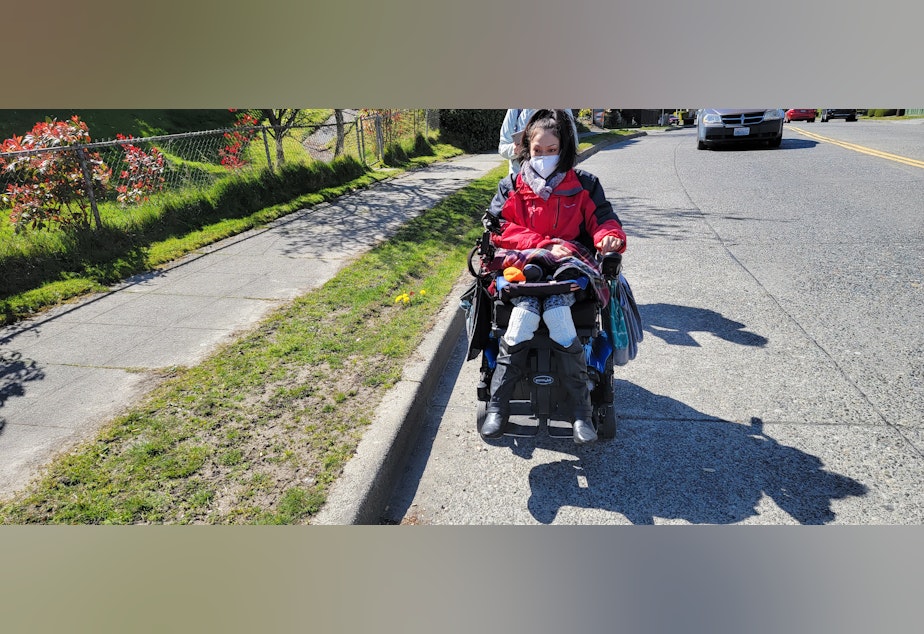Why these Seattle area politicians promised not to drive for one week

For one week in October, dozens of Western Washington officials who might normally drive their cars are making sure their bicycles, transit passes and smartphone maps are ready to go. For this week, they're losing their cars.
They’re participating in the first-ever “Week Without Driving,” taking place October 22-29, 2021, organized by the advocacy group Disability Rights Washington. In case they need help, organizers have matched the politicians up with non-driving "technical advisors" who already know the ropes.
About a quarter of the people in Washington state don’t drive a car to get around according to the Disability Rights Washington. That includes children, seniors and people with disabilities. This week policymakers who have volunteered to not drive will get to understand the real-world impact of their own decisions (and votes) around mobility.
They’ll be paired with people like Tanisha Sepulveda in West Seattle, who said she can’t drive her heavy wheelchair on local sidewalks because they’re too bumpy and gravelly. And if it snows, forget about it.
“So instead I ride in the road because they’re paved for wheels and they’re smooth,” she said. “I ride on the shoulder of the road and that’s not safe for me either, and that’s not safe for the people driving. But it’s the safest option I have.”
Sepulveda said she chose her Highland Park neighborhood because it’s near two bus stops that can take her to downtown Seattle. Her biggest concern beyond safer streets and sidewalks is that people with disabilities are so reliant on transit, but improved transit can lead to higher rents that those people can’t afford.
Sponsored
“We shouldn’t be pushed out of accessible areas,” she said.
Micah Lusignan is a recent UW grad who is legally blind. He said he recently flew home to Seattle and was grateful to stay with his dad who lives near the airport, rather than making the trip home.
“Part of that was because to get back to my house in Lynnwood from Seatac would have taken me almost two hours,” Lusignan said.
He said he hopes the politicians participating in the challenge will realize the role that transportation plays in allowing people with disabilities to work and do errands the way people with cars are able to do.
One of the participants in the Week Without Driving is King County Council Chair Claudia Balducci, who lives in Bellevue and said she’s already been embracing alternatives to her car.
Sponsored
“I was pretty cocky about this challenge. I’ll be honest with you, I ride my bike, I take the bus, this is how I get around,” Balducci said.
Until she recently needed to get from East Bellevue to East Sammamish. Balducci said she's concluded that commuting from the East Side to Seattle is pretty easy, but getting around her own suburban district is not.
“I’m committed to do it, I won’t get into my car – it’s going to be an interesting experience," she said.
The instructions to participating officials say they can’t drive themselves under any circumstances, but: “If you decide to, you can ask someone else to drive you, but make a note of how much you ‘owe’ this person in their time, and if you felt obligated to support them in other ways (ie, doing all the dishes).”
Another politician who signed up for the challenge is State Sen. Rebecca Saldaña. She said she expects to do “a lot of juggling” during the week and use the Zoom option for some of her meetings. Saldaña said her Rainier View neighborhood in Seattle has access to transit – but she’s trying to figure out how to get her kids to after-school activities that normally mean driving to Shoreline, Mt. Baker and Burien.
Sponsored
“I’ve been talking to my kids, they want this to be real” she said. “But then as it gets closer they’re like, ‘why did you agree to that?’”
Balducci’s "technical advisor" who can help with mobility advice is Erica Clawson, who uses a heavy wheelchair and also relies on transit. “Plan ahead and have a good idea of how long it’s going to take to get from where you are somewhere,” Clawson suggested, adding that there’s nothing like the stress of realizing you needed to leave the house ten minutes ago to catch the right bus.
But Clawson also said living in Northgate and hopping on the new light rail line has been a revelation.
“Being able to decide, oh I’d like to have this kind of food or oh I need to get to a doctor’s appointment or anything else – and just like by myself, just go.”
Coordinators say after the Week Without Driving they will do exit interviews with participants to find out what they learned, and how it might shape their priorities. The week is part of the Disability Mobility Initiative led by Disability Rights Washington. Anna Zivarts directs the initiative. She said the two biggest issues people described in a recent study were a lack of sidewalks and a lack of reliable transit.
Sponsored
“The goal of the initiative is to empower non-drivers — people who are disabled or too old to drive or just don’t have access to a car for whatever reason — to speak up and have our mobility needs met in our state,” she said.




